Tangle is an independent, ad-free, non-partisan politics newsletter where I answer reader questions from across the country. If you found Tangle online, you can subscribe below.
Today’s read: 7 minutes.
We’re covering the intra-Democratic fighting, a question about the VAT tax and a huge Supreme Court ruling.
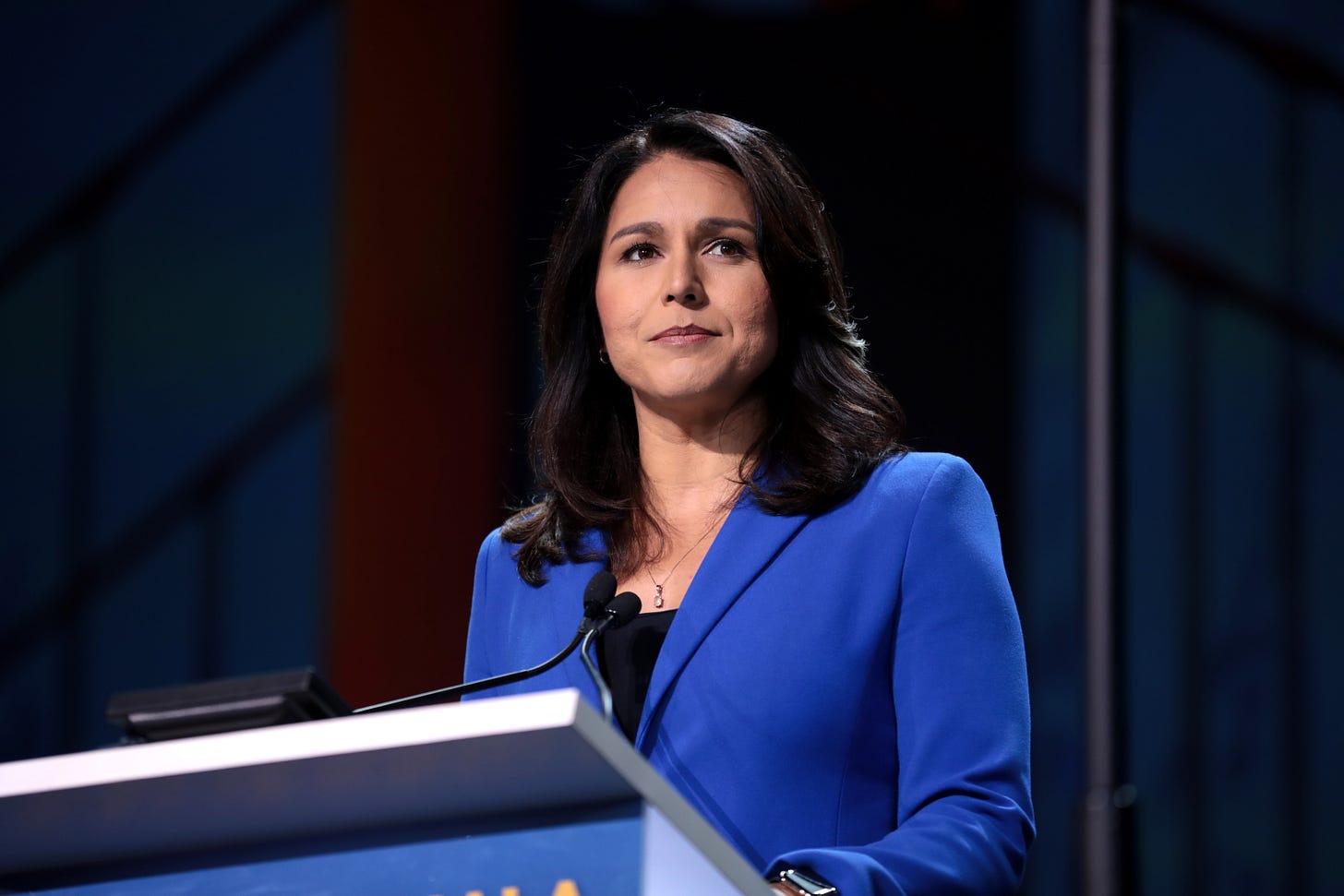
Gage Skidmore / Wikicommons
A note.
The way I think about Tangle is in three parts: “What D.C. is talking about” is what you might find on the front page of the newspaper, CNN, or all over Twitter. The reader question is what Tangle readers want to know. “A story that matters” and all the other parts around those sections are things I think are important for you. I hope this newsletter can be a holistic, well-rounded wrap up of the news that cuts through the noise, with occasional scoops and insights you can only find here. I’m always open to feedback, all you have to do is respond to this email.
Support Tangle.
If you want to support this newsletter, the best way to do it is to help me sign up new subscribers. You can do that by:
Sharing this link on social: https://tangle.substack.com/welcome
Forwarding this email to a few friends (or a hundred!)
What D.C. is talking about.
Tulsi Gabbard and Hillary Clinton. Last week, during an appearance on a left-leaning podcast, Clinton claimed that the Russians are “grooming (Gabbard) to be a third-party candidate” and described Jill Stein as “also a Russian asset.” Gabbard responded by sarcastically thanking Hillary on Twitter: “You, the queen of warmongers, embodiment of corruption, and personification of the rot that has sickened the Democratic Party for so long, have finally come out from behind the curtain. From the day I announced my candidacy, there has been a concerted campaign to destroy my reputation. We wondered who was behind it and why. Now we know — it was always you, through your proxies and powerful allies in the corporate media and war machine, afraid of the threat I pose. It’s now clear that this primary is between you and me. Don’t cowardly hide behind your proxies. Join the race directly.” Her tweet was shared more than 80,000 times, and she followed it up with a sit down on Fox News with Tucker Carlson.
What Democrats are saying.
It depends which Democrats. Tulsi is about as divisive as it gets. The Hawaiian representative is the first practicing Hindu and the first Samoan-American member of Congress. She’s also the first female combat veteran to run for president, having served in the Army National Guard. Many Democrats pointed to her time serving her country and called it gross that Hillary would claim she was a Russian asset. “Tulsi Gabbard has put her life on the line to defend this country,” Bernie Sanders tweeted. “People can disagree on issues, but it is outrageous for anyone to suggest that Tulsi is a foreign asset.” Other left-of-Clinton liberals expressed frustration she’d step back into presidential politics and cheered on Tulsi for calling her out as being part of the establishment, corporate-media-supported, pro-war Democratic wing of the party. Democratic nominees for president Cory Booker, Beto O’Rourke and Andrew Yang all defended Gabbard either directly or through their campaigns as well.
But Hillary isn’t exactly backing down. Clinton spokesperson Nick Merril responded to Gabbard’s attack, "Divisive language filled with vitriol and conspiracy theories? Can't imagine a better proof point than this." Hillary didn’t provide any proof of her claim that Tulsi is being groomed by Russia, but supporters have pointed to the way Russian news and propaganda sites give Gabbard’s campaign lots of focus, elevate her social media accounts with trolls and bots online, and how Gabbard’s foreign policy aligns closely with the Kremlin’s. Perhaps the most controversial thing about Gabbard, that Democrats frequently hit her over, is the way she is an “Assad apologist.” Those accusations stem from a secret trip Gabbard took to Syria to meet with the Syrian dictator in 2017. After the trip, which was arranged by the Assad regime, Gabbard continued to forcefully decry the “regime change” war in Syria and claimed there were no moderate rebels fighting Assad and echoed propaganda that he was a well-intentioned ruler fighting off terrorists.


What Republicans are saying.
They love it. Not only did Tulsi hammer their favorite foe, Hillary Clinton, but Republicans are generally glad to see Gabbard create some fractures in the Democratic party, especially as they all try to wrangle President Trump. And nobody loves Tulsi more than pro-Trump Republicans. Tulsi’s repeated calls for American isolationism and the end of war overseas is perfectly aligned with Trump’s foreign policy, and many of the foreign policy positions of Trump-supporting conservatives. When Gabbard was appearing on Fox News, she received a softball interview from Tucker Carlson, who basically spoonfed her talking points to defend herself. It’s why President Trump rushed to her defense on Sean Hannity last night. “I don't know Tulsi Gabbard, but I know one thing: she's not an asset of Russia. These people are sick. There's something wrong with them," Trump said.
Conservatives who lean more “Never-Trump” would seldom take sides with Hillary, but they’re not about to jump into bed with Gabbard either. They’ve basically taken the line that Hillary’s comments were gross and also damaging because they’re enabling another terrible politician to raise her profile.


My take.
Tulsi Gabbard is a fascinating politician to follow. I have a tough time thinking of anyone who liberals like Bernie Sanders will rush to defend, even as they make appearances on Fox News for fawning interviews with Tucker Carlson. The New York Times story that helped launch this controversy has a great lede about Tulsi’s bizarre fan following, noting that she has received rave reviews from Stephen Bannon, President Trump’s former chief strategist, Richard B. Spencer, the white nationalist leader, former Representative Ron Paul, who says she has “libertarian instincts,” and even Franklin Graham, the influential evangelist, who finds her “refreshing.”
One person whose opinion caught my attention was Jon Soltz. He’s the chairman of the liberal veterans group VoteVets.org, and I actually know Jon from interviewing him and writing about his organization. I respect him.
“In reality, Tulsi is really running on an antiwar message that’s consistent with where a lot of veterans are,” Soltz told The New York Times. “I know everyone thinks there’s a conspiracy theory here but that’s really what she’s doing.”
I think that’s mostly true. As far as I can tell, Gabbard’s biggest issue is ending war, and that push — according to her — comes from her experience as a veteran, her “aloha,” and perhaps even her background as a Hindu. Tulsi also ruled out a third-party run early on in her campaign, so if she keeps her word on that it’ll make Hillary look even more absurd. I haven’t seen any evidence that Tulsi is a Russian agent or Russian asset, and I think the accusation is laughable. That being said, I also think Tulsi has gone to unsettling lengths to justify the horrid, unforgivable actions of leaders like Assad. She’s also cheered on Prime Minister Narendra Modi of India, who has an abysmal record of treatment against India’s minorities. And she met with Abdel Fattah el-Sisi, Egypt’s leader who has his own history of human rights violations. Gabbard has disavowed support from white nationalists, conspiracy theorists, anti-Semitites and Holocaust deniers, but it’s impossible not to wonder why she’s getting that support in the first place.
For what it’s worth, we’re also just peeling back the onion of her life and political history. She’s never been under the microscope like she is now, and new context for her politics come out every day. Perhaps the most interesting read I’ve come across about Tulsi was about her bizarre upbringing following a cult-like Hindu leader. You can read that profile in NYMag by clicking here.
Four homepages.
We’re all getting different news. Take a look at the homepages of The New York Times The Wall Street Journal, The Washington Post and Fox News today:
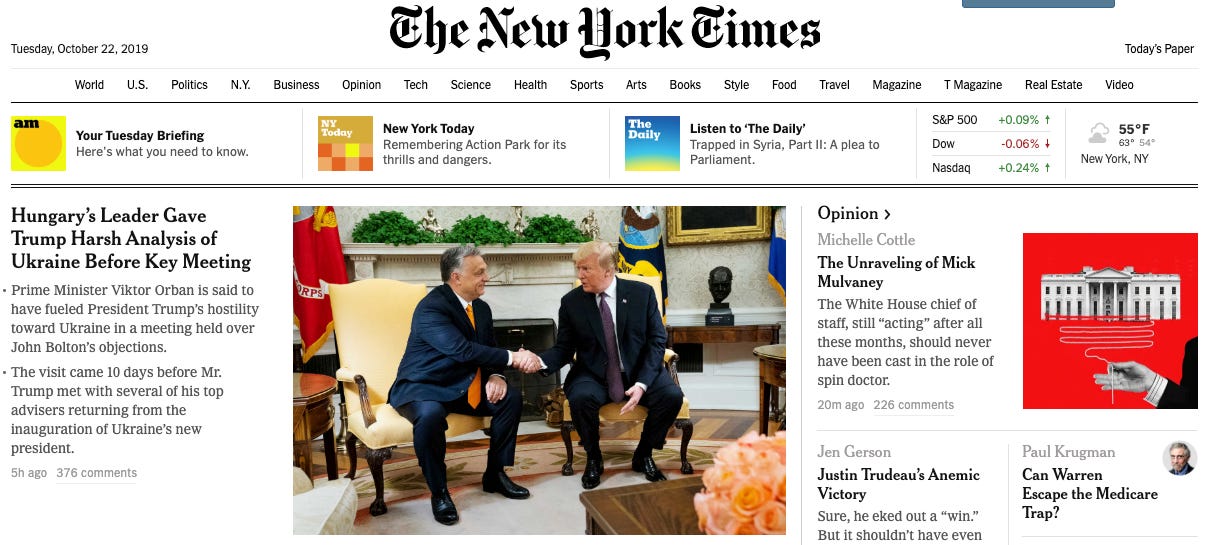
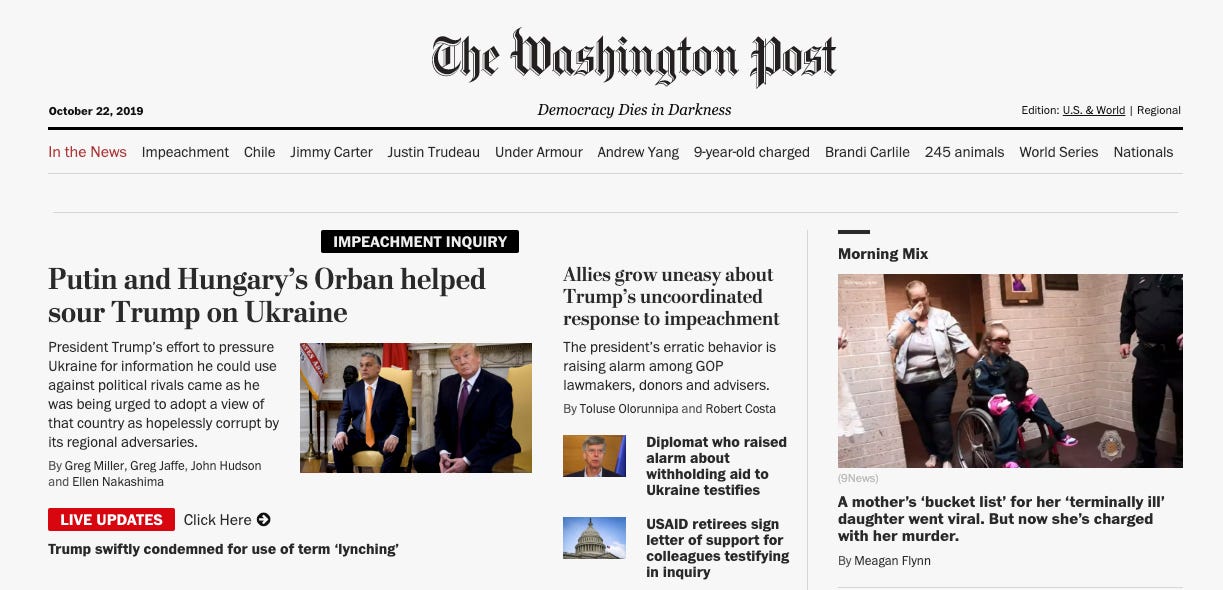
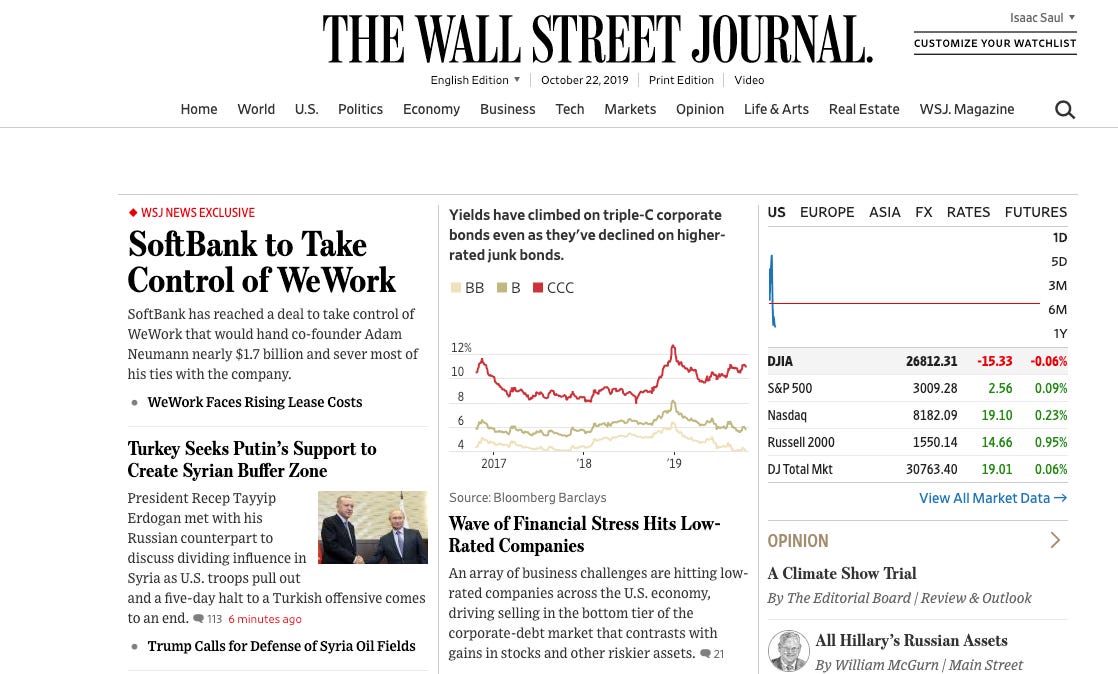

Your questions, answered.
Reminder: Tangle is about answering reader questions from across the country. I want to wade through the news for you, so you don’t have to. If there’s something you want to know, simply reply to this email.
Q: Can you go over what the value-added tax is? What are the talking points against it?
- Chris, New York, NY
Tangle: The value-added tax, commonly known as the VAT, is an alternative to sales tax that is used in the European Union and basically every other industrialized nation in the Organization for Economic Cooperation and Development (OECD) except for the United States. It’s been back in the news a bit because Democratic candidate Andrew Yang, who is running on his forward-thinking business acumen, supports implementing a VAT in the U.S.
Unlike a sales tax, which occurs at one stage of production (when you, the consumer, buys a product), a VAT happens at every stage of production. Investopedia offers this simple example of a 10 percent VAT:
A farmer sells wheat to a baker for 30 cents. The baker pays 33 cents; the extra 3 cents represents the VAT, which the farmer sends to the government.
The baker uses the wheat to make bread and sells a loaf to a local supermarket for 70 cents. The supermarket pays 77 cents, including a 7 cent VAT. The baker sends 4 cents to the government; the other 3 cents were paid by the farmer.
Finally, the supermarket sells the loaf of bread to a customer for $1. Of the $1.10 paid by the customer, or the base price plus the VAT, the supermarket sends 3 cents to the government.
Proponents of the VAT argue that it’s easier to track and only levies taxes when value is added to a product, hence its name: the value-added tax. They also note that it would raise serious government revenue and help us reduce the deficit, or the annual difference in how much money the government spends versus how much revenue it brings in (right now, the deficit is huge: the federal government is spending way more money than it is collecting each year). Opponents of the VAT say small businesses couldn’t absorb the added cost at different stages, that it’d inflate the price of goods and hurt sales in the retail market, ultimately hurting low-income people the most. One 2013 analysis estimated it’d reduce retail spending by $2.5 million over 10 years and cost 850,000 jobs.
Yang has proposed a 10 percent VAT on goods and services which he says will pay for the $1,000 a month “Freedom Dividend” every American would receive from his administration. Yang’s proposal has a 10 percent rate on most goods, but no VAT on things like groceries and a higher VAT on things like a yacht. He says that by using a VAT, companies like Google and Amazon, who “are excellent at moving things around to avoid taxes” and “funnel hundreds of billions in earnings overseas” would have trouble avoiding taxes. Still, a VAT faces serious opposition from both the left and the right. Progressives in the U.S. say that because a VAT is applied evenly across the population, low-income people spend much higher rates of their income on the tax. The right says a VAT will raise so much government revenue it will only encourage the feds to expand and waste more money. Support for the VAT, which varies across the countries who use it, seems to correlate mostly with trust or support in bigger government and their ability to use the additional revenue wisely.
As for Yang’s proposal, the most thorough look at it came from Kyle Pomerleau of the Tax Foundation. According to his analysis, even with the VAT, a carbon tax, changing the tax rates on capital gains and lifting the cap on maximum earnings subject to social security taxes, Yang would still come up about $1.5 trillion short of the money he needs to pay for a Universal Basic Income every year.
A story that matters.
On Monday, the Supreme Court threw out a challenge to maps drawn by Republicans for district boundaries in Michigan. The case came before the Supreme Court after Democrats claimed a map Republicans drew was gerrymandered to ensure their political victories for years to come. A panel of three judges in Michigan ruled that the maps were an unconstitutional gerrymander and ordered the Republican legislature to draw new maps. But the Supreme Court has now repeatedly ruled that the gerrymandering involves "political questions beyond the reach of the federal courts." The justices put the three-judge panel’s ruling on hold, effectively erasing it and leaving the maps in place for 2020. After 2020, it will be up to a bipartisan commission to draw new maps, which was a system that voters put into place in a statewide referendum in 2018, NBC News reported. You can read more here.
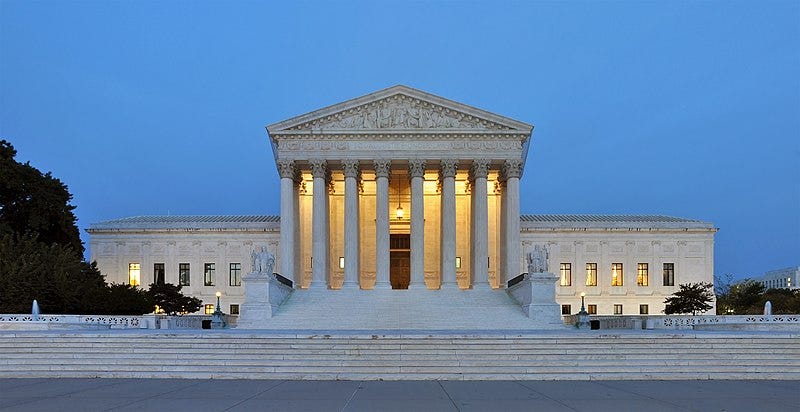
Joe Ravi / CC-BY-SA 3.0
Numbers.
6. That’s how many of the top-ten traffic-driving Facebook posts belonged to conservative news outlets or personalities yesterday. The other four posts were from Occupy Democrats, Dallas Cowboys, “Intelligence is Sexy” and Delish.
50 percent. The number of Americans who say Donald Trump should be impeached and removed from office, according to a new CNN poll. It’s an all-time high.
$292,000. The amount of money Pete Buttigieg is spending on primary TV and radio advertisements in Iowa this week.
$0. The amount of money Joe Biden is spending on primary TV and radio advertisements in Iowa this week.
$260 million. The price tag of a settlement reached between four drug companies and two Ohio counties over the opioid crisis. The federal trial was going to be the first-ever about the opioid crisis before the settlement was reached.
26. That’s how many billionaires own the same amount of wealth as 3.8 billion people across the globe, according to the World Economic Forum.
Have a nice day.
A formerly incarcerated opioid addict is running for Congress in Illinois, and she’s out with a powerful advertisement about her personal journey. Sarah Gad says her doctors prescribed her opioids after a car accident and sent her down a path of addiction and crime. She says she was “sexually assaulted, beaten, stabbed and denied medical care” during her incarceration, all with the complicity of corrections officers. If elected, she’d become the first formerly incarcerated woman ever elected to Congress.



